
Search
Answers to two questions could determine whether PAYG solar energy companies reach their growth tipping point in developing countries or fall flat, unable to achieve significant size and profit. First, can these organizations attract enough capital to accelerate expansion? Second, can they build and sustain a far-flung agent sales and service network to signup and retain solar system customers?
Investment dollars are flowing to PAYG, off-grid solar industry companies – like M-Kopa, Off-Grid Electric, d.Light, BBOXX and Mobisol – with over $360 million raised between 2012 and September 2016, more than half of that amount in 2015, according to a Bloomberg New Energy Finance white paper. Debate about whether the funding is “too much, too soon” hasn’t staunched the stream of additional capital like the $80 million M-Kopa raised in 2017 but has given way to suggested metrics developed by the Global Off-Grid Lighting Association (GOGLA) and World Bank Group to help investors evaluate company performance and future investment potential.
At the same time, “… companies working in the off-grid lighting and electrification sector operate in difficult and often unpredictable market conditions,” said Koen Peters, Executive Director of GOGLA, explaining a 7% decrease in worldwide sales of off-grid solar products from the second half of 2016 to the first half of 2017. That’s 5.2 million products sold and about $95.57 in combined cash sales revenue. Despite the drop, the industry association said off-grid solar companies are still expanding into new markets. The New Yorker reports that M-Kopa has at least half a million pay-as-you-go solar customers while d.light is “adding eight hundred new households a day.”
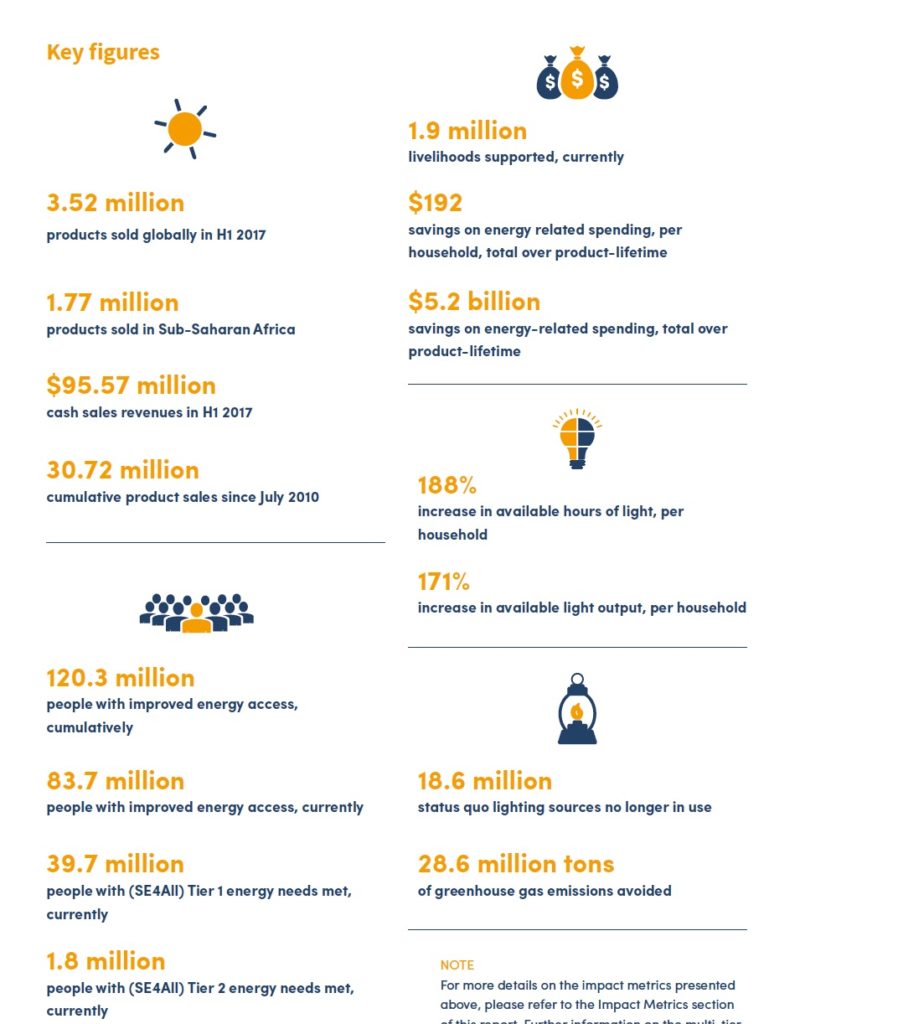
Market report for January to June 2017, includes performance data from 65 companies. Source: Global Off-Grid Lighting Association
While these PAYG solar companies push forward, the industry is still trying to crack the code on building and maintaining the agent networks that are the backbone of their growth strategy. Hard lessons learned by TaroWorks customers, other social enterprises and NGOs working in financial inclusion, agriculture, biofuel, sanitation and small business development may offer PAYG solar companies direction on how to successfully expand agent networks and maximize mobile and cloud-based technology to help agents build strong customer and partner relationships. In its 2017 report, “Reaching Scale In Access To Energy”, strategy consulting firm Hystra concludes that:
“Successful organizations providing energy access need more than great products and financing solutions. They need strong customer care driven organizations to unlock” barriers like affordability, access and reliability. “All in all, reaching scale in energy access will require investment in strong relationships with satisfied customers, as only they can drive the necessary word-of-mouth, loyalty, and repeat sales.” (Read More)
By allowing low-income residents of rural areas to buy solar home systems and other solar-powered products with installment payments via mobile money – while using the equipment each day – and empowering solar system operators to turn those products on or off remotely based on payment schedules, PAYG solar is lauded for making off-grid power more accessible.
There have been growing pains, however, as solar companies roll out sales and service agent networks to manage such relationships and PAYG solar technology. According to a group of World Bank energy, technology and digital finance specialists, what makes PAYG a powerful tool can also challenge a field sales force:
“When the first wave of PAYG products hit the market, sales staff was engaged in cash-based one-off transactions, obtaining a commission for each product that they sold. However, while PAYG technology has enabled the rapid deployment of new units (over 700,000 in just 5 years), it has also forced agents to develop an additional set of skills. Agents can no longer focus on one big sale. Instead, they now have to engage in a longer, more sophisticated sales process that includes non-traditional direct sales tasks such as tracking repayments and reminding customers with outstanding payments (some of whom may be their neighbors) to repay every month…Unfortunately, it seems that companies have not yet figured out how to best manage their agent networks, and the high turnover among agents is becoming a big risk to growth and sustainability of the sector.” (Read More)
Maintaining and servicing PAYG solar units is also driving companies to have their agent networks adapt when it comes to customer relationships:
“PAYG, by introducing larger systems that are purchased over time, has increased the prevalence of component-based repair instead of straight product replacement,” explained Jacob Lewandowski, Director of Platform at d.light. “It’s important to address any customer issue with speed, and the higher ticket cost of key components changes the calculus of whether a repair or replacement is more cost effective in the field.”
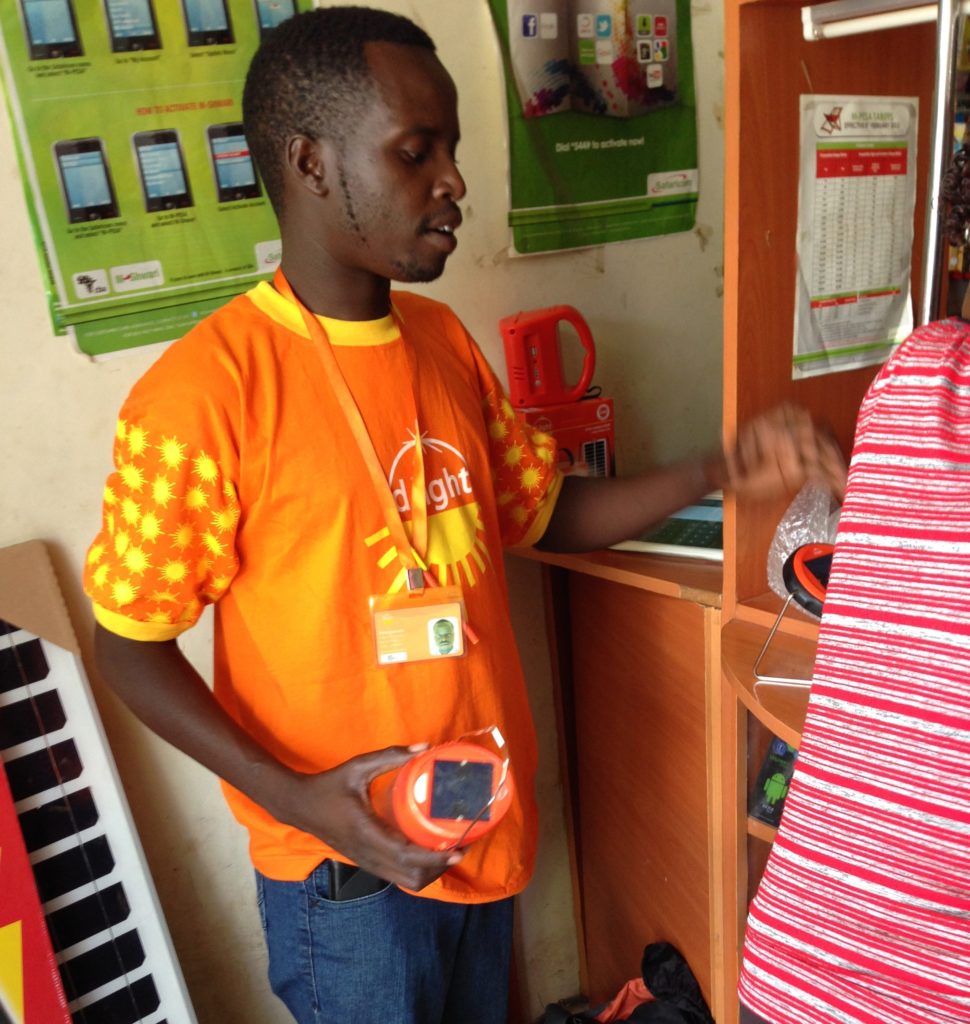
d.light sales agent visits retail outlet in Nakuru County, Kenya. Source: TaroWorks
Additional challenges faced by PAYG solar companies building sales and service agent networks fall into at least two major categories: (1). Sales – Deciding on a direct, contractor or partner sales model (or some mix) and handling fluctuations in seller activity due to economic, environmental or other outside factors. (2). Agent Management – Developing comprehensive initial and in-service training programs, maintaining regular contact with agents to set goals and manage performance and creating incentives to encourage loyalty among agents.
The experiences of industry sectors with a longer track record running agent networks, like mobile network operators, health and sanitation organizations and groups assisting smallholder farmers offer some best practices that may benefit PAYG solar field teams as they grow. Here are just a few examples:
Sales:
Control Agent Network Size – According to the Helix Institute, the research and training arm of financial services consulting firm Microsave, “Rushing to launch a network without this strategic clarity can set up a network for failure from the very beginning, such as by aiming to cover a whole country with agents when in fact a targeted focus on a specific remittance corridor would deliver a more profitable network.” The GSMA, a group which represents mobile operators worldwide, suggests a three stage approach to agent network expansion. It also cites the experience of PAYG solar companies like Mobisol in Rwanda – which trained its agents to sell mobile money accounts as well as solar systems as a way to intelligently grow agent networks by diversifying revenue.
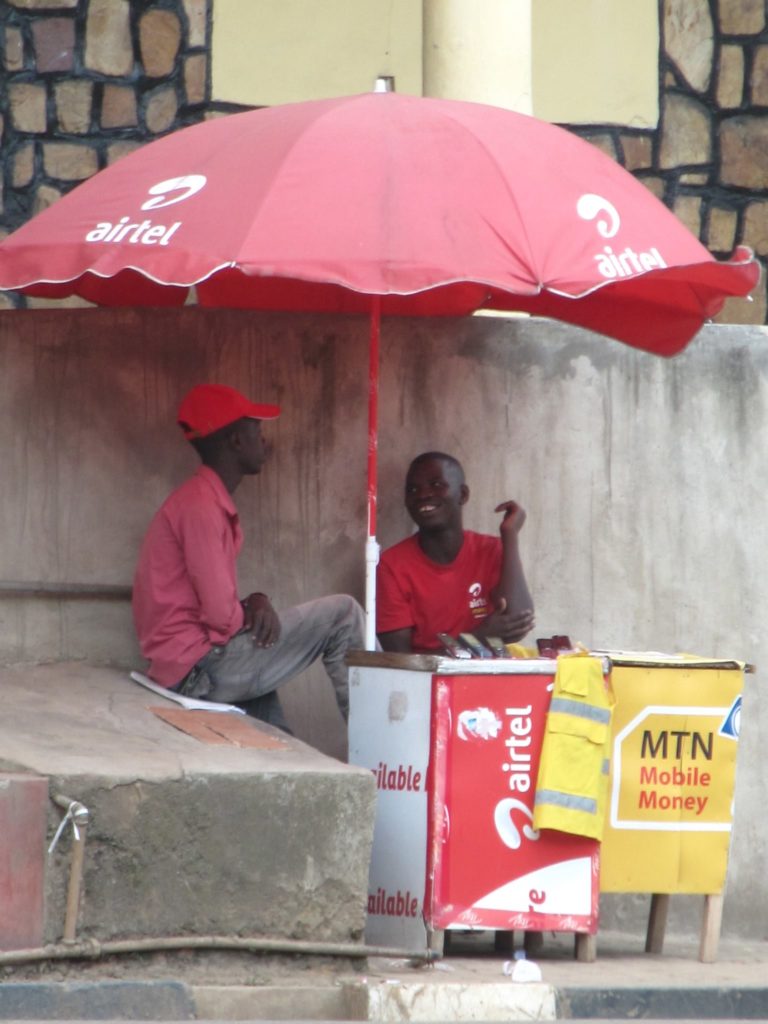
Mobile money agent in Kigali, Rwanda. Source: Howard Sherman
Tier Agent Compensation – TaroWorks CEO Brent Chism writes that “many MNOs use a two-tiered channel structure for both lines of business…In airtime, Vodacom Tanzania pays its sales partners for airtime volume. MNOs, however, incent mobile money aggregators by paying some money for the sign up, but more money for repeated agent activity over time.” (Read More) Mobile money agent networks have also effectively used loyalty programs to cut down on agent attrition.
Use Mobile Tech To Track Sales and Manage Relationships – SOIL – which provides access to ecological sanitation through a toilet service that also produces rich, organic compost – digitized their sales and service activities to scale operations in Haiti, where they’ve distributed toilets to over 1,000 families. Using our mobile app and offline CRM, SOIL tracks prospects who have expressed interest in the service, signs contracts, manages customer accounts, gathers and responds to complaints and maintenance requests, deploys customer satisfaction surveys and collects payments. (Read More)
Develop Asset-Based Lending Expertise – As PAYG solar companies sell more products to base of pyramid consumers using asset-locked financing, they’ll most likely need to call on expertise in loan underwriting and collection. Biogas system producer Sistema.bio decided to develop such skills in-house, including creating a credit scoring methodology, when high interest rates and long loan approval times made Mexico microfinance institutions an undesirable option. (Read More)
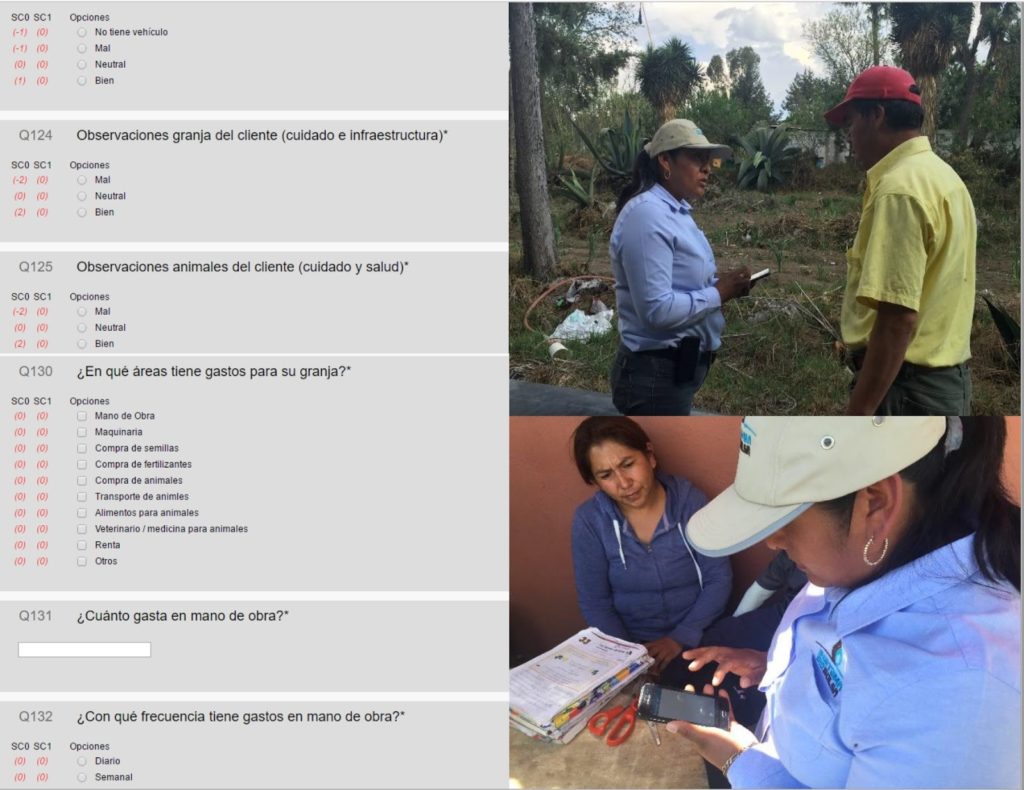
Sistema.bio field agents collect credit scoring data using a mobile questionnaire. Source: Sistema.bio
Agent Management:
Don’t Scrimp On Onboarding and Initial Training – Digital financial services agent trainer and researcher Helix Institute concludes that “Providers could invest more in agent onboarding and ongoing support”. Helix Institute research has found that an agent’s number of daily transactions and monthly profitability is significantly greater after receiving training in the first three months of employment compared to agents who have not been trained during that time period.
All the cutting edge mobile data collection hardware and software in the world isn’t worth much if your field team breaks into a cold sweat when asked to use it. To avoid problems, make the effort needed to thoroughly train PAYG solar field staff on the use of any mobile technology needed to do their job. We’ve learned that lesson and offer these tips.
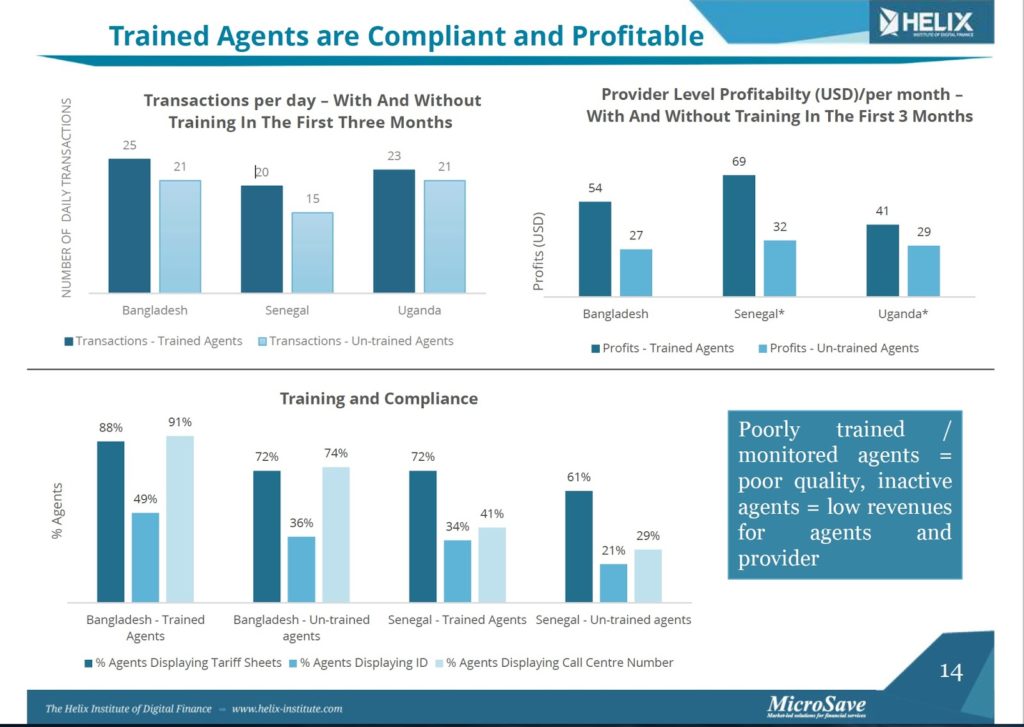
Source: MicroSave/Helix Institute
Provide Ongoing Support to Agents and Measure Performance – “Too many agents are left to their own devices and never receive monitoring or support visits,” according to a Helix Institute analysis of financial service agent networks in 11 countries. Regular field visits to agents, in-service seminars on best practices and refresher training on the product or technology are important ways to maintain a strong, ongoing relationship with agents.
Setting clear and measurable sales, service and maintenance goals for field teams is equally important. Catholic Relief Services (CRS) used TaroWorks’ mobile data collection and analysis app, a cloud database and our offline CRM tool built into the app to increase the productivity of field teams by allowing CRS to set goals for each survey agent collecting information during a financial diaries project and track progress against those goals (Read More). GSMA suggests developing an “agent classification matrix” based on forecasts of agent growth and transactions to rank agents on performance.
Sweat The Small Stuff – You need to create systems to support field agent networks to take care of the small details that can derail use of your product or service. If you don’t, your customers will suffer no matter how much you’ve invested in hardware, software and systems. (Read More)
According to Lesley Marincola, CEO of Angaza, a PAYG technology provider, expansion efforts by off-grid solar energy companies will rise or fall on the quality of their agent networks:
“Sales agents are the lifeblood of rural distribution in emerging markets, where e-commerce access and transportation channels are sparse. Distributors that successfully operate at scale will have to figure out how to recruit, train, and retain a network of highly-effective sales agents.”
This article originally appeared on the Renewable Energy World blog.
POST TOPICS
Sign up to receive emails with TaroWorks news, industry trends and best practices.
TaroWorks, a Grameen Foundation company.
Site by V+V